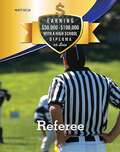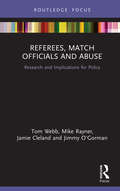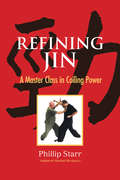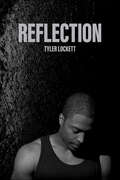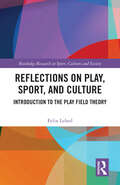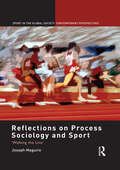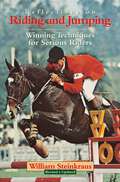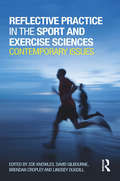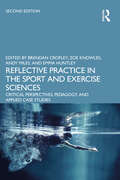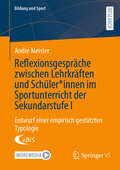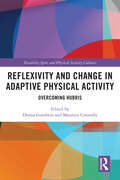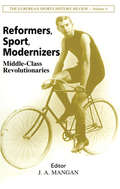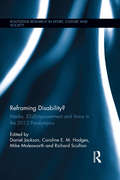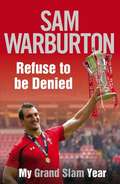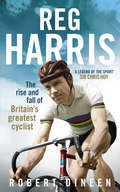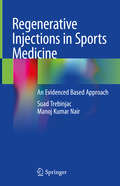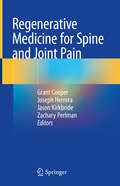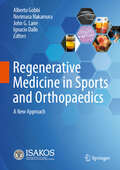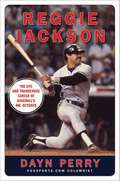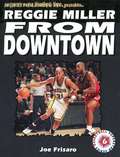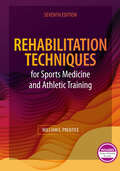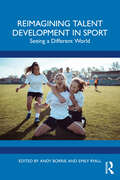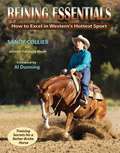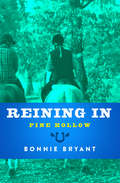- Table View
- List View
Referee (Earning $50,000 - $100,000 with a High S #14)
by Marty GitlinFor many high school graduates, college is a way to get ahead, but going to college is not the only way for young adults to succeed. Many people choose to enter the workforce after high school to start earning money and gaining experience right away. These motivated young workers can have rewarding jobs without ever having to earn a 4-year college degree. If you're interested in sports and don't know that you want to--or can--go to college, a career as a referee may be right for you. Young people need only a high school diploma or equivalent to start work as a referee, and they can eventually earn more than $50,000 a year. In Referee, you'll learn how to start a career as a sports official and what you need to succeed in the field. Find out about the prospects for careers for sports officials in the future, how much referees can make each year, and whether your path to success includes a career as a referee.
Referees, Match Officials and Abuse: Research and Implications for Policy (Routledge Focus on Sport, Culture and Society)
by Jamie Cleland Tom Webb Mike Rayner Jimmy O'GormanThis book explores issues related to the abuse of referees and match officials in sport. Drawing on original empirical research in football, rugby union, rugby league and cricket, it provides an insight into the complexities involved in the recruitment, retention and development processes of match officials from across the global sports industry. Using an evidence-based approach, the book examines why abuse occurs, the operational environments in which match officials operate, and underlying issues and trends that cut across sports and therefore can be linked to wider societal trends. It challenges global sport policy and discusses the development of an inclusive, cohesive and facilitative environment for match officials, players, coaches and spectators to ensure the future provision of global sport. Referees, Match Officials and Abuse is an invaluable resource for all students, scholars and national governing bodies of sport with an interest in match officials, sports governance, sport policy, sport management and the sociology of sport.
Refining Jin: A Master Class in Coiling Power
by Phillip StarrA kung-fu champion explains the “coiling power” of Jin and how to subtly refine it for a more relaxed but explosive force, which can be used with multiple fighting and martial-arts styles Adding to the numerous basic exercises from his previous book, Developing Jin, Phillip Starr focuses on more advanced and subtle aspects of emitting the legendary “coiling power.” Starr explains this unique technique with straightforward ease, dozens of detailed photos, and the patience of a master teacher. This book is ideal for students interested in the martial-arts systems of baguazhang, taijiquan, and xingyiquan (or “coiling power”) who want to deepen their understanding and practice.
Reflection
by Tyler LockettFueled by faith and powered by a strong work ethic, Tyler Lockett's debut book of poetry is a reflective and uplifting journey through topics such as identity, sports, race, relationships, and how to live a purposeful life. As an NFL All-Pro wide receiver and return specialist for the Seattle Seahawks, Lockett draws on his unique perspective as a professional athlete to address life's many challenges, temptations, and rewards. From reminding young people to pursue their dreams, to pleading with a friend not to take his own life, Lockett's poetry encourages readers to stay positive even when confronting impossible odds. In addition to never-before-published poems, Reflection also includes workshop questions, notes, and inspirational messages that give readers an opportunity to reflect on their own lives as well.
Reflections on Play, Sport, and Culture: Introduction to the Play Field Theory (Routledge Research in Sport, Culture and Society #141)
by Felix LebedThe psychological dependence of humanity on playing is huge. Its nature and functional utility are unclear. These linked yet contradictory issues have created the intrigue that has fed philosophical thought for more than two hundred years. During this period, philosophy transferred many of the subjects of its analysis to the aegis of the humanities that it spawned. Each of them pays close attention to human play and studies it with its own methods of theoretical and experimental research. Thus, what was once a general philosophical comprehension of human play has branched out into different directions, definitions, and theories. This new book represents a renewed general view of human play. The unique quality of the volume lies in its fairly rare interdisciplinary methodology, encompassing a broad spectrum of the humanities: philosophy, anthropology, sociology, and the history of play, and behavioral analysis of playing, which have been done by the author. As a result, the volume ends with the proposition of a new general approach to human play that is named by the author “play field theory”. Such an approach makes reflections on play, sport, and culture a source for all scholars studying play, by widening their knowledge through both a new general view and their familiarization with notions from neighboring fields and disciplines.
Reflections on Process Sociology and Sport: 'Walking the Line' (Sport in the Global Society – Contemporary Perspectives)
by Joseph MaguireThe book focuses on the distinctive contribution that Joseph Maguire has made to process sociology and the study of sport. Maguire’s work over the past three decades highlights how process sociology has a unique perspective on the relationship between sport, culture and society, and to the body, globalisation and civilisational analysis.Reflecting on this body of work and the use of process sociology, Maguire captures the research dynamic of ‘walking the line' between involvement and detachment, theory and observation, and engagement and critique. The book is structured around four broad sections: Theory, Sport and Society; The Meaning of Sport, Body and Society; Case Studies in Sport and Process Sociology; Globalisation, Sport and Civilisational Analysis.Providing an introduction to, and key examples of, a process sociology approach to the study of sport, the body, civilising processes and globalisation, this book will appeal to undergraduates, postgraduates and researchers in sport studies / sports science degrees, sociology, cultural studies and to those studying migration, globalisation and cross cultural civilisation relations.This book was previously published as a Special Issue of Sport in Society.
Reflections on Riding and Jumping
by William SteinkrausA revised and updated edition of a classic work on horses and horsemanship by one of the most acclaimed riders in show jumping history.
Reflective Practice in the Sport and Exercise Sciences: Contemporary issues
by Zoe Knowles David Gilbourne Brendan Cropley Lindsey DugdillDrawing on the experiences of scientists, researchers, practitioners and teachers in a wide range of sport and exercise settings, this book explores contemporary issues in reflective practice and considers the way that reflective practice impacts upon applied practice, on research methodology and on professional development. It includes chapters on the use of reflective practice in areas as diverse as: delivering coach education sport psychology support working in sports physiology developing young players in sport exercise-related interventions physiotherapy working inside a professional football club student skills and the physical activity and health curriculum Based on multi-disciplinary work in education and the health sciences, and exploring the crucial interface between learning and practice, this book is important reading for all sport and exercise scientists and any professional working in sport and exercise looking to become more effective practitioners.
Reflective Practice in the Sport and Exercise Sciences: Critical Perspectives, Pedagogy, and Applied Case Studies
by Zoe Knowles Brendan Cropley Andy Miles Emma HuntleyWithin the Sport and Exercise Sciences (SES) and allied disciplines, reflective practice has become firmly established as a fundamental aspect of education, professional training and development, and applied service delivery. This has resulted in an emerging, context-specific evidence base that has attempted to make sense of the application and utility of reflective practice as a mechanism to facilitate personal and professional growth through experiential learning, and subsequently develop the knowledge required to navigate the complexities of applied practice. This new and fully revised edition of Reflective Practice in the Sport and Exercise Sciences explores the contemporary conceptual landscape, critical perspectives, pedagogy, and applied considerations in reflective practice in the SES and allied disciplines. Contributions from scientists, researchers, practitioners, and academics offer innovative perspectives of reflective practice, founded on a synthesis of the contemporary empirical evidence base and applied practitioner experience. These contributions challenge academic and/or practice-based audiences regarding the utility, research, and representation of reflective practice, while offering critical insights into the application of different approaches to reflective practice. Based on exploring the crucial interface between learning and practice, this book is important reading for all who work in the SES and allied disciplines, and, more widely, any professional aiming to become a more effective practitioner. This book is endorsed by the British Association of Sport and Exercise Sciences.
Reflexionsgespräche zwischen Lehrkräften und Schüler*innen im Sportunterricht der Sekundarstufe I: Entwurf einer empirisch gestützten Typologie (Bildung und Sport #39)
by André MeisterReflexionsprozesse durch Gespräche anzustoßen, auf Ebene der Gespräche zu begleiten und selbst zu durchlaufen, kann als besondere Anforderung an Sportlehrkräfte betrachtet werden. Die Studie stellt heraus, dass Reflexionsgespräche zwischen Sportlehrkräften und Schüler*innen situativ variieren und widmet sich der Frage, wie und wozu Reflexionsgespräche im sportunterrichtlichen Alltag geführt werden. Die entwickelte Typologie von Reflexionsgesprächen kann als Ausgangspunkt für differenzierte Betrachtungen von Reflexionsphasen im Sportunterricht fungieren.
Reflexivity and Change in Adaptive Physical Activity: Overcoming Hubris (Disability Sport and Physical Activity Cultures)
by Donna Goodwin and Maureen ConnollyThis provocative and challenging book argues for the vital importance of critical self-reflexion in the field of adaptive physical activity (APA). It makes a powerful case for embracing discussions of the harm caused by ableist assumptions of the ideal body, maximizing capabilities and perfecting normativebased movement that dominate contemporary discourse in APA, and calls for more critical introspection about what APA is, how it is performed, and what might be needed to bring a collaborative relational ethic to this field. This book focuses on two key themes: Firstly, how ableism as a foundational belief system of APA is present in the undergraduate curriculum, professional preparation, professional practice, and organizational policies. Secondly, how to make the comfortable uncomfortable by openly debating the harm that results from non-reflexive (nondisabled) hubris in APA. The goal is to spark an exchange of ideas among scholars, practitioners, and organizational leaders and therefore to shift the paradigm from one of professional expertism to one that centres disability wisdom holders, bringing a fundamental change yo how we perform adaptive physical activity. This book is important, progressive reading for anybody with an interest in adaptive physical activity, adapted physical education, disability sport, inclusive education, the philosophy and ethics of disability and sport, or disability in wider society.
Reformers, Sport, Modernizers: Middle-class Revolutionaries (Sport in the Global Society #Vol. 4)
by J. A. ManganA record of the role of selected middle-class individuals across Europe who made notable contributions to the early evolution of modern sport and who saw success in modern sport as an expression of human qualities to be admired, applauded and encouraged. They viewed sport, sometimes self-interestedly but not always self-interestedly, as a medium of personal, collective and national virtue. It is the first general consideration of a selection of these innovatory pioneers and proselytisers who placed Europe at the forefront of major developments in contemporary world sport - now a phenomenon of global significance.
Reframing Disability?: Media, (Dis)Empowerment, and Voice in the 2012 Paralympics (Routledge Research in Sport, Culture and Society #41)
by Daniel Jackson Caroline E.M. Hodges Mike Molesworth Richard ScullionThe London 2012 Paralympic Games - the biggest, most accessible and best-attended games in the Paralympics' 64-year history - came with an explicit aim to "transform the perception of disabled people in society," and use sport to contribute to "a better world for all people with a disability." This social agenda offered the potential to re-frame disability; to symbolically challenge "ableist" ideology and to offer a reinvention of the (dis)abled body and a redefinition of the possible. This edited collection investigates what has and is happening in relation to these ambitions. The book is structured around three key questions: 1. What were the predominant mediated narratives surrounding the Paralympics, and what are the associated meanings attached to them? 2. How were the Paralympics experienced by media audiences (both disabled and non-disabled)? 3. To what extent did the 2012 Paralympics inspire social change? Each section of this book is interspersed with authentic "voices" from outside academia: broadcasters, athletes and disabled schoolchildren.
Refuse To Be Denied
by Sam WarburtonRefuse to be Denied is the Wales captain's personal account of a remarkable period in his young rugby life that ended with his receiving the Six Nations trophy after Wales had completed a stunning Grand Slam in March 2012. The year began with his promotion to the captaincy for the match against the Barbarians in June 2011. At just 22 years of age, it came as a complete shock to Sam Warburton and he admits it became a problem in his own mind. As he frankly reveals, he thought long and hard about accepting the role for the World Cup. But he did, and he did a fine job, leading his team on a superb run at the World Cup in New Zealand. It ended in personal trauma for Warburton as he was sent off in the semi-final against France for a tip tackle on France wing Vincent Clerc. He relives this moment and its aftermath in intricate detail, taking the reader into his own mind, as well as the Wales dressing room afterwards. From that low point, Warburton recovered to play his part in a wonderful Grand Slam campaign, not least with his man-of-the-match display in the tight victory over England at Twickenham. Revealing, funny and honest, Refuse to be Denied also details the hardship of three Poland training camps that helped draw the squad together. But, most importantly, it captures for the reader the excitement and passion of a momentous year in Welsh rugby that opened up such glorious possibilities for the future. Sam Warburton was born in Cardiff in 1988. He has a twin brother, Ben, and a sister, Holly. He attended Whitchurch High School, where he was a classmate of the international footballer Gareth Bale. He made his Cardiff Blues debut in 2009, and his Wales debut, against the United States of America, in the same year. In June 2011, he was named Wales captain aged just 22, the country's second youngest captain after the great Gareth Edwards. He led them to the World Cup semi-final later that year, and in 2012 to the Six Nations championship, in which they won every game, achieving the fabled Grand Slam. Steve James is a former Glamorgan and England cricketer, who now writes on cricket and rugby for the Daily Telegraph. This is his fifth book, but his first on rugby, having written an autobiography, two books with former England coach Duncan Fletcher, and The Plan, detailing the England cricket team's rise to number one in the world.
Reg Harris: The rise and fall of Britain's greatest cyclist
by Robert DineenReg Harris, whose statue overlooks the Manchester Velodrome, is the legend who all track cyclists want to emulate. He was a poor, working-class boy born in the Depression who escaped the Lancashire mills to utterly dominate his sport. He triumphed as world champion an incrediblefive times between 1947 and 1954 and performed medal-winning heroics at the London Olympics.At his peak he was the most adored sportsman in the country attracting huge crowds, sponsorship, and the company of the rich and famous. But, fiercely driven and ruthlessly single-minded, Harris had a dark side. His was a sensational life fuelled by an insatiable need for money, celebrity, fast cars and beautiful women that constantly threatened to destroy him. Following an exhaustive investigation, Robert Dineen has uncovered an epic sporting rise and fall – a story more astounding than anyone had known.
Regenerative Injections in Sports Medicine: An Evidenced Based Approach
by Suad Trebinjac Manoj Kumar NairThis book sheds new light on the complex area of regenerative injections used in sports injuries and musculoskeletal conditions, pursuing an evidenced-based approach. Largely ignoring orthopedic surgery, which would involve arthroscopic procedures and scaffolding as they are practiced mainly by orthopedic surgeons, the book instead focuses on injection-based treatments that are particularly useful in sports medicine and for musculoskeletal pain conditions. Including evidence from systematic reviews, meta-analyses, and randomized controlled trials, the book provides a comprehensive overview of regenerative injections such as dextrose, platelet-rich plasma and stem cell therapy, along with their history and scientific basis. It also includes detailed information on the preparation methods, steps of the procedure, and clinical conditions most likely to benefit from it. Given its scope, the book offers a valuable tool for all medical practitioners whose work involves painful musculoskeletal conditions, e.g. sports medicine physicians, orthopedists and interventional physiatrists, as well as general practitioners.
Regenerative Medicine for Spine and Joint Pain
by Grant Cooper Joseph Herrera Jason Kirkbride Zachary PerlmanRegenerative medicine (RM) is a rapidly expanding topic within orthopedic and spine surgery, sports medicine and rehabilitation medicine. In the last ten years, regenerative medicine has emerged from the fringes as a complement and challenge to evidence-based medicine. Both clinicians and patients alike are eager to be able to offer and receive treatments that don't just surgically replace or clean old joints or inject away inflammation or work as a stop-gap measure. Regenerative medicine encompasses everything from the use of stem cells and platelet-rich plasma (PRP) to prolotherapy, viscosupplementation and beyond. This book will provide healthcare practitioners dealing with spine and joint pain with the most current, up-to-date evidence-based information about which treatments work, which treatments don't, and which are on the horizon as potential game changers. Chapters are arranged in a consistent format and cover the spine, shoulder, elbow, hand and wrist, hip, knee, and foot and ankle, providing a thorough, top-to-bottom approach. A concluding chapter discusses current and future directions and applications of RM over the next decade or two.Timely and forward-thinking, Regenerative Medicine for Spine and Joint Pain will be a concise and practical resource for orthopedists, spine surgeons, sports medicine specialists, physical therapists and rehabilitation specialists, and primary care providers looking to expand their practice.
Regenerative Medicine in Sports and Orthopaedics: A New Approach
by Alberto Gobbi Norimasa Nakamura John G. Lane Ignacio DalloThis book offers a comprehensive overview of the rapidly evolving field of regenerative medicine, including key breakthroughs in clinical therapies. It is further aimed at facilitating ethical, high-quality research in Sports Medicine and Orthopaedics. Set apart by its unique structure, it bridges the gap between basic science and practical applications. Divided into three distinct sections, it begins by laying a strong foundation, delving into the biological and molecular underpinnings of regenerative medicine, including stem cells, growth factors, gene editing, tissue engineering, nanotechnology, and bio-manufacturing. The second section takes readers on a journey into the clinical applications of regenerative medicine, offering valuable guidance and insights for practitioners. The third section, dedicated to future trends and bio-materials&’ applications, sheds new light into the evolving landscape of this field. By providing a structured, comprehensive, and up-to-date resource, it equips researchers, clinicians, residents and students with the knowledge needed to make a positive impact in this ever-expanding domain. Written in collaboration with ISAKOS, this volume serves as an invaluable tool in advancing readers&’ understanding and practice in the field.
Reggie Jackson: The Life and Thunderous Career of Baseball's Mr. October
by Dayn PerryThis in-depth biography of the outspoken Yankee slugger is “a well-rounded portrait of one of baseball’s most celebrated and controversial figures” (Kirkus Reviews).From CBS sportswriter, baseball analyst, and author of Winners: How Good Baseball Teams Become Great Ones, this book presents Reggie Jackson in all his glory—a thrilling, in-depth biography of the Hall of Fame slugger from his childhood to his legendary years with the Yankees and into the twenty-first century. A monumental sports story filled with such stellar baseball names as George Steinbrenner, Billy Martin, Jim “Catfish” Hunter, Thurman Munson, and Bucky Dent, Reggie Jackson is the first to cover the entire twenty-one-season career—from the 1967 Kansas City A’s to the 1987 Oakland A’s—of the colorful, outspoken athlete whom the Sporting News listed as one of the 100 Greatest Baseball Players of all time.“Perry teases out the combustible, contradictory, provocative aspects of Jackson’s personality—not to mention his talent for demolishing a baseball—that still make him such an irresistible personality to this day.” —Booklist“Dayn Perry, a damn fine writer, brings an insightful, fresh analysis to the career of Mr. October.” —Peter Golenbock, New York Times–bestselling author of George: The Poor Little Rich Boy Who Built the Yankee EmpireIncludes photographs
Reggie Miller: From Downtown (Superstar Ser. #Vol. 6)
by Joe FrisarReggie Miller is the NBA's all-time leader in three-pointers made and attempted. He has led the Pacers in scoring for nine straight seasons, and was the first player in team history to start an NBA All-Star Game. In 1999 Miller led the Pacers in scoring and three-pointers made and attempted, and had the best free-throw percentage in the NBA (.915). A graduate of UCLA, he ranks third on the school's all-time career scoring list with 2,095 points. Miller is involved with a variety of children's charities, and is the national spokesperson for the Reading is Fundamental Program.
Regulative Schmerztherapie: Praxismanual für Ärzte, Physio-, Ergo- und Sporttherapeuten
by Wolfgang Laube Axel DaaseDie regulative Schmerztherapie ist mit ihren physiologisch begründeten aufeinanderfolgenden Interventionen spezifisch auf die Verhinderung bzw. Behandlung von chronischem Schmerz ausgerichtet. In diesem Buch wird die gesamte nicht pharmakologische Therapiekette von möglichen Interventionen vorgestellt. Es werden dabei passiv provozierte Maßnahmen zur Schmerzlinderung und Durchblutungsförderung beschrieben, mit dem Ziel die Gewebeverhältnisse als Grundlage der Schmerzinformationen zu verbessern. Zudem werden aktive Methoden vorgestellt, z. B. das Beweglichkeitstraining von Gelenkregionen und andere aktive therapeutische Belastungsinterventionen, die den Körper in eine anti-nozizeptive Reorganisation bringen können. Das Buch ist somit ein Leitfaden für die nicht-medikamentöse Schmerztherapie und die medizinische Rehabilitation aller chronisch nicht entzündlichen und entzündlichen Erkrankungen und kann auch bei onkologischen Krankheiten angewandt werden. Als Zielgruppe werden Physiotherapeuten, Sporttherapeuten und Ärzte angesprochen, die Schmerzpatienten betreuen.
Rehabilitation Techniques for Sports Medicine and Athletic Training
by William PrenticeRehabilitation Techniques for Sports Medicine and Athletic Training, Seventh Edition is the definitive reference for athletic training students and professionals who are interested in gaining more in-depth exposure to the theory and practical application of rehabilitation techniques used in a sports medicine environment.Dr. William Prentice and his contributors have combined their knowledge and expertise to produce a single text that encompasses all aspects of sports medicine rehabilitation. Featuring more than 1,000 full-color illustrations, 700 high-resolution videos, and an integrated laboratory manual, this newly updated Seventh Edition provides the athletic trainer with a complete guide to the design, implementation, and supervision of rehabilitation programs for sport-related injuries.The Seventh Edition includes new and updated information on topics including:• Pharmacology and the role of medication in pain management and performance• Nutrition and its impact on rehabilitation• Rehabilitation techniques for the core • Roles within the rehabilitation team• Pathomechanics and epidemiology of common injuries• Psychological considerations and communication with injured patients• Tips for documentation from Dr. Prentice Included with the text are online supplemental materials for faculty use in the classroom.Rehabilitation Techniques for Sports Medicine and Athletic Training, Seventh Editionis a comprehensive resource for athletic training students, faculty, and clinicians; physical therapists who manage rehabilitation programs for sports-related injuries; as well as for strength and conditioning coaches who supervise performance enhancement programs on return to play.
Reimagining Talent Development in Sport: Seeing a Different World
by Andy Borrie Emily RyallReimagining Talent Development in Sport takes a fresh look at the processes, systems and fundamental beliefs about talent. It brings together researchers, practitioners and former Olympic athletes to re-imagine the way talent development programmes work and the foundational values they are built on. This book imagines an environment that is able to achieve both sporting success and long-term athlete well-being.Talent development systems are now part and parcel of all effective high-performance sport systems in Olympic and professional sports. Talented young athletes are being recruited into programmes at ever younger ages as sports are looking to identify and attract athletes who they perceive have potential to become senior elite performers. Just the mathematics of talent development means there will always be a higher number of young athletes who are rejected by a talent pathway than ever reach the end of the pathway and become elite adult performers. So, we need new ways of thinking that allow us to find ways of nurturing athletic potential at the same time as developing the person. Reimagining Talent Development in Sport examines new ways of conceptualising talent programmes so that the young athlete is seen as a whole person first and an athlete second. This book touches on a wide range of topics encompassing sociological perspectives, philosophical thinking and new ideas on re-defining ‘success’, as well as discussing programmes that are already being implemented in pursuit of creating more ethical and positive approaches to talent development.Accessible to both academics and practitioners, Reimaging Talent Development in Sport is key reading for practitioners and academics who have an interest in talent development, skill acquisition and coaching programmes.
Reining Essentials
by Sandy CollierWorld Champion trainer and rider Sandy Collier provides this indispensable guide of progressive training exercises for the reining horse. Whether green broke, or &“push-button,&” every horse will perform more willingly, cleanly, and quickly with work on what she calls the &“Seven Essentials&”—the foundational basics every riding horse needs. Like no other book out there, Collier breaks down the maneuvers required in a reining pattern and the tricks and techniques for introducing them, perfecting them, and showing them off in competition.You&’ll learn about:• Collection and steering—condensing your horse&’s frame and getting his feet to follow his nose• Lead departures, circles, and spins—preparing for the lope, &“hunting the circle,&” and driving into the spin• Stops, back-ups, and rollbacks—perfecting the slide, moving backward with cadence, and swinging &‘round 180 degrees over the hocks• Lead changes—getting it right and preventing anticipation
Reining In (Pine Hollow #3)
by Bonnie BryantWill Lisa Atwood make a decision that will split up three best friends forever? Seventeen-year-old Lisa never thought she&’d be spending the summer three thousand miles away from her two best friends, Carole and Stevie, and her boyfriend, Alex. But sunny California has its perks—like a dream job working on the set of Paradise Ranch, one of the hottest shows on TV. It&’s got horses and good-looking guys—like seriously swoon-worthy actors Skye Ransom and Jeremiah Jamison. Back home, Carole&’s still crushing on stable hand Ben Marlow, who&’s as gorgeous—and mysterious—as ever, and Stevie continues to brood over the near-fatal car accident from earlier in the summer. Then Stevie and Carole decide to take matters into their own hands. Will they be able to bring back their friend? Or will Lisa stay in Los Angeles forever?
